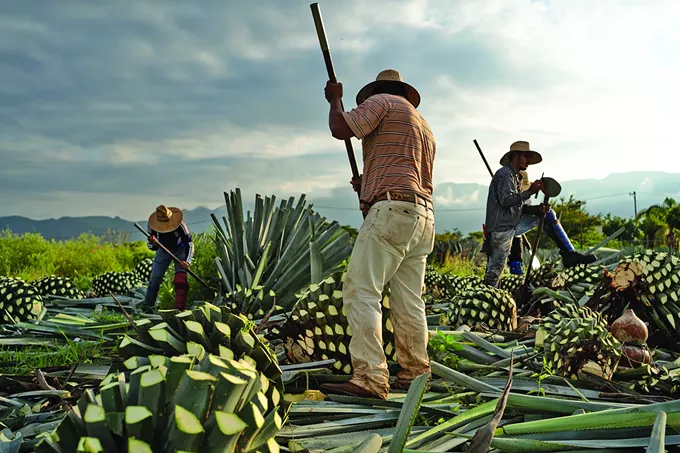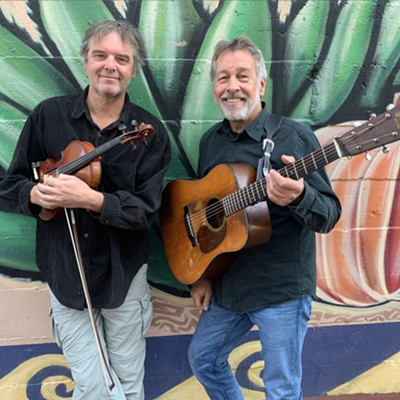According to Aztec mythology, the agave plant is a gift from the gods with the ability to bring comfort when its liquid is prepared and ingested. And while agave spirits have certainly brought their fair share of comfort and joy throughout the years, the plant group has also found its way into art, medicine, cuisine and even weaving. All of these facets are on display, when the 14th annual Agave Heritage Festival takes over multiple venues across town from Thursday, April 28 to Sunday, May 1.
Started in 2008, the Agave Heritage Festival was originally more confined as a celebration of mezcal and tequila. But over the years, its scope has expanded to include agave’s cultural, historical and commercial significance throughout the borderlands. This year’s festival includes panel discussions, workshops, music, art exhibitions — and still plenty of opportunities to enjoy beverages as well.
“Agave’s intersection of spirits, culture, art and ecology is almost hard to describe in words,” said Todd Hanley, festival founder and general manager of Hotel Congress. “It’s been really interesting to see the festival evolve toward the agave plant as a symbol of sustainability and resilience. The ecology and science of the agave plant related to the mezcal industry has been a pleasant surprise, and worked with my business ethos around Hotel Congress and Maynards Kitchen.”
While the festival’s signature event, the Agave Fiesta, takes place at Hotel Congress, other participating locations include the University of Arizona, Mission Garden, the Loft Cinema and the Desert Laboratory on Tumamoc Hill. The first full version since the pandemic, this year’s Agave Heritage Festival packs dozens of events into just a few days.
One of the most unique events is hosted at the “living agricultural museum,” Mission Garden, where participants can view the ancestral practice of an agave roasting pit. Mezcal is traditionally crafted by harvesting the piña (or heart) of an agave plant and roasting it in an earthen oven, producing the signature smoky flavor. This demonstration at Mission Garden is paired with a sampling of the agave, and also serves as a fundraiser for the gardens. And as with almost every Agave Heritage Festival event, this will be accompanied by music and “mezcaleros” discussing the drink.
“It really does make it easier to understand the importance of culture and heritage when you’re in a fun and engaging environment,” Hanley said. “My knowledge of agave distillate and mezcal is still truly limited, because it is a living, breathing spirit. But what I’ve learned is that whenever I sip on mezcal, I really do try to consider the story of the product without over analyzing it. I’m more appreciative of it because I’ve visited these rustic and almost ancient palenques to see the work. You can read about how laborious the work is, but to actually experience it first-hand totally changes your view. It’s almost hard to not overthink it.”
Hanley also said that Hotel Congress’ new jazz club, The Century Room, works in concert with agave’s role. It’s a meeting place for culture and a historical craft — plus it carries plenty of mezcal and tequila. The new location, converted from the Copper Hall space, hosts touring and local jazz performers in a more intimate setting than other Hotel Congress venues. It’s hosting multiple Agave Heritage Festival events, such as Sonoran singer Lila Downs, Navajo jazz composer Larry Redhouse, and the Amilcar Guevara Latin Jazz All Stars. The Century Room is also home to the Festival’s wrap-up party, which will feature the Zona Libre Latin Jazz Band and obligatory mezcal tastings.
Hanley says Hotel Congress and Maynards are working with agave spirits that are “closest to the festival ethos as possible,” meaning they are focusing on hand-selected and more sustainably sourced drinks to highlight.
“On some levels, Tucson and Southern Arizona is almost a ground zero for how we need to adapt to the climate realities that we stare at daily,” Hanley said. “I want to create tourism for downtown Tucson and Southern Arizona that engages in the environment, not just takes from the environment. There’s a new but small movement called ‘restorative tourism’ where you’re going into an area and giving back to the community. Sometimes tourism can overwhelm the ecology, so I want the Agave Heritage Festival to be a symbol of tourism as well as environmental sustainability.”
To that end, many of the events also come with an ecological and conscientious focus, such as the Women of Mezcal panel at the Tucson Convention Center. According to panelist Francesca Claverie of the Borderlands Restoration Network, the event’s focus is to highlight the women involved in the historically male-dominated mezcal production industry. Claverie is a native plant specialist in the borderlands region, and will be discussing sustainability related to agave.
“Unlike so many other spirit festivals, the Agave Heritage Festival is really big on promoting the conservation aspects of agaves, since it’s such an extractive process,” Claverie said. “It’s such an important thing to keep in mind, and more and more producers are taking note of that. The industry is really changing with how we think about inclusivity and conservation with the product.”
Claverie explains a common misconception about sustainability that consumers might have is that agave spirits are produced in the same style as other liquors. However, she says it is on “such an intensely different timeline” and there are larger ecological impacts related to the harvesting and the pit ovens.
“Agaves in general are a huge cultural plant in the borderlands, and it’s really exciting right now the amount of information that is changing, whether it’s basic landscaping to bacanora producers who are on board to help conserve this plant because they realize there’s a problem with overharvesting of agaves as it surges in popularity through Europe and the United States,” Claverie said.
Blue agave takes an average of seven years to mature before it is ready to harvest for tequila production, making it difficult to keep up with demand. This has led to the overharvesting of immature wild agaves in some Mexican states, spelling ecological trouble for agave pollinators like the long-nosed bat.
The Borderlands Restoration Network works throughout Southern Arizona and across the border, such as with the Colectivo Sonora Silvestre, to promote habitat restoration, environmental education and responsible land stewardship.
“It really does come down to consumer education. If they aren’t asking for or purchasing environmentally friendly mezcals, the whole process doesn’t work. And the Agave Heritage Festival is a great way to have that education,” Claverie said. “It’s so special to be able to combine this education with a celebration, because so often, as a conservationist there’s a spin on ‘you can’t do this anymore!’ This way people can learn about conservation and still get excited.”
With the industry trying to become more environmentally friendly, different manufacturers are setting sustainability goals. For instance, the producer Mezcal Vago has set a goal of planting three agaves for every one agave they harvest. In addition, they’ve also discussed ending the use of wild agave by 2025 for most of their releases.
“We want to have a focus on ethical and sustainable spirits production,” said Francisco Terrazas, brand manager at Mezcal Vago. “Being from the borderlands, I always felt a familiarity and connection with the ecosystems that produce these spirits. They tend to be more arid and warm and I feel like that is reflected in the spirit. Using unaged agave spirits, I feel they transmit the flavor and taste of the raw material. Whereas if you’re using a wood-aged whisky, the overarching theme on the flavor profile will come from the wood. I feel unaged spirits are a more honest representation of the material producing the spirits.”
Terrazas is from Tucson, and previously worked at Maynards. With his agave spirits knowledge and connection to the Hotel Congress group, he has helped organize some of the programming for the Agave Heritage Festival. This year, he will discuss mezcal at Hotel Congress’ art exhibition opening of agave and mezcal photography.
“There’s 20 or so states in Mexico that have a history of producing agave spirits, and Mexico is such a geographically diverse country which inherently leads to cultural diversity,” Terrazas said. “So looking across those 20 different states, you’re looking at a vast variety of climates and cultures that are producing these spirits. It’s a great way to learn about these different places and people.”
With unique opportunities to see mezcal roasting, and a focus on sustainability, Terrazas says the Agave Heritage Festival is one of the best spirits events he’s seen, and “it gets bigger and better every year.”
“There are so many elements of the human experience that this one plant touches,” Terrazas said. “I hope people get an appreciation for the various contexts the agave plant has. It’s a food source, it’s a resilient plant, it has a richness of flavor diversity, and it’s so representative of culture. I think if they appreciate all the different facets of this one type of plant, that’s going to lead them to more responsible buying decisions, which is ultimately what interests me as a brand representative and as someone invested in sustainability.”
While such a large event being focused around a single type of plant may seem like a bottleneck, Terrazas argues agave is multifaceted enough to interest almost anyone in some way. He even says mezcal itself is far more diverse than people might think.
“I think one thing people get wrong is they might believe the flavor profile is homogenous,” Terrazas said. “They may have had one bad tequila one time, and they think that’s what all these spirits taste like. In reality, agave spirits have the richest diversity of flavor profiles across the board. People might have the conception that all mezcal is inherently smoky, and that’s just not true. Of course, some are very smoky, but others can be light. It’s such a wide family of flavors.”
For the Agave Heritage Festival, Tucson Mayor Regina Romero even formally proclaimed Tucson as a “City of Century Plants.” In a special release in partnership with the Tucson City of Gastronomy, Romero explained how ubiquitous agave is in Tucson’s history, as well as front yards. It plays a large role in the ecology and economy, and may strengthen international bonds; the governor of the state of Sonora, Alfonso Durazo, has announced plans to make a traditional agave distillate, bacanora, a core part of the state’s economy. Romero expressed an intention to build “a partnership between the City of Tucson and the State of Sonora to continue to explore our economic, cultural, and geographic ties.”
“Tucson and Southern Arizona is such a unique region and so close to the border, I hope people realize that agave breaks down barriers,” Hanley said. “Learning about the people involved, the history, the geography — it’s an amazing plant.”
Agave Heritage Festival
Thursday, April 28 through Sunday, May 1
Multiple events at Hotel Congress, the Loft Cinema, El Crisol bar, Mission Garden, Hotel McCoy, University of Arizona and more














